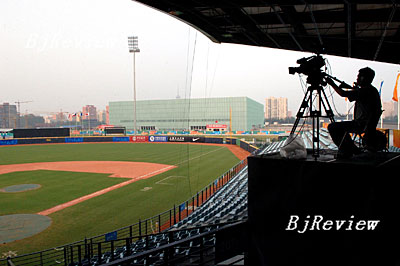
The most critical information we are keen on delivering is that everything is going well, said Sun Weijia, Director of the Media Operations Department of the Beijing Organizing Committee for the Games of of the XXIX Olympiad (BOCOG) on the eve of the 2007 World Broadcasters Conference.
The conference, which took place from September 23-29, is the last one before the Beijing Olympic Games, thus ushering in a final spurt for preparations for broadcasting of the Beijing Olympics and Paralympics, Sun pointed out.
It's television that fuelled interest in the Olympics and has sustained it for so long, said former President of the International Olympic Committee Juan Antonio Samaranch. Television broadcasting and sponsorship have been dubbed as the major two financial pillars of the modern Olympics.
The past two world broadcaster conferences in 2005 and 2006 placed emphasis on work plans and range of services, while this year it delves into the implementation of the plans. BOCOG has reported a satisfactory result in implementing plans, added Sun.
BOCOG and concerned governmental organizations have co-established the Olympic Broadcasting Committee, responsible for affairs concerning broadcasters, such as entering or leaving the country, customs, taxation and work permits. Through its work it aims to build a sound work environment in line with Olympic practices and in pursuant of the requirements of international broadcasting institutions.
The building of an international press center for the Olympics is on track, with major construction already completed and interior installation underway. The press center resembles an exhibition center, and the installation is designed to turn it into a press center in accordance with Olympic reporting requirements. The press center is scheduled to come into use in February 2008, said Sun.
Beijing Olympic Broadcasting Co. Ltd. (BOB), a major broadcaster of the 2008 Beijing Olympic Games, will begin to set up work area for itself and other broadcasters in October 2007. It will be finished by February 2008.
Companies similar to BOB were established for recent Olympic Games by the host cities. Apart from building and running the international broadcasting center and facilities in other arenas and servicing rights-holding broadcasters, BOB also provides television and radio signals for Olympic events and activities.
Radio signals, supplied by BOB to every country, will be of the highest quality. Rights-holding television and radio stations will broadcast the signals after processing.
BOCOG requires broadcasters to present audiences not only with the sense of being present, but also with a feeling of comfort. "It's an explicit target of broadcasting that watching the Olympics on television should be a treat, an experience different from attending the arena," said Ma Guoli, Chief Operation Officer (COO) of BOB. "Broadcasters should take into account all things that audiences wish to watch to minimize what they miss."
| 